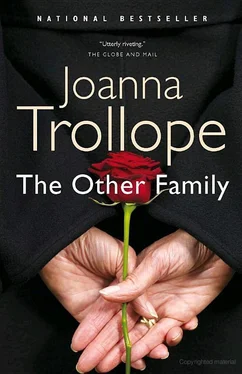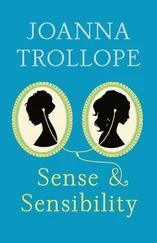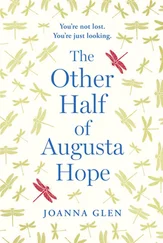Joanna Trollope - The Other Family
Здесь есть возможность читать онлайн «Joanna Trollope - The Other Family» весь текст электронной книги совершенно бесплатно (целиком полную версию без сокращений). В некоторых случаях можно слушать аудио, скачать через торрент в формате fb2 и присутствует краткое содержание. Жанр: Старинная литература, на английском языке. Описание произведения, (предисловие) а так же отзывы посетителей доступны на портале библиотеки ЛибКат.
- Название:The Other Family
- Автор:
- Жанр:
- Год:неизвестен
- ISBN:нет данных
- Рейтинг книги:5 / 5. Голосов: 1
-
Избранное:Добавить в избранное
- Отзывы:
-
Ваша оценка:
- 100
- 1
- 2
- 3
- 4
- 5
The Other Family: краткое содержание, описание и аннотация
Предлагаем к чтению аннотацию, описание, краткое содержание или предисловие (зависит от того, что написал сам автор книги «The Other Family»). Если вы не нашли необходимую информацию о книге — напишите в комментариях, мы постараемся отыскать её.
The Other Family — читать онлайн бесплатно полную книгу (весь текст) целиком
Ниже представлен текст книги, разбитый по страницам. Система сохранения места последней прочитанной страницы, позволяет с удобством читать онлайн бесплатно книгу «The Other Family», без необходимости каждый раз заново искать на чём Вы остановились. Поставьте закладку, и сможете в любой момент перейти на страницу, на которой закончили чтение.
Интервал:
Закладка:
‘Can’t tel you here.’
‘Amy,’ Tamsin said again, ‘I’m working. You shouldn’t be here.’
‘Ten minutes,’ Amy said. ‘Tel them it’s family stuff. It is family stuff.’
Tamsin hesitated. There was her natural curiosity and, in addition, there was the aggravation of not knowing something that, by rights, she should both have known and have known first.
She said, ‘I’l ask Denise.’
Amy nodded. She watched Tamsin go across to talk to a girl with dark hair in a short glossy bob. The girl was typing. She neither looked up nor stopped typing when Tamsin bent over her, but she nodded, and then she stood up and fol owed Tamsin back to the reception desk.
‘This is my sister Amy,’ Tamsin said.
‘Hi,’ Amy said.
Denise looked at Amy. Then she said to Tamsin, ‘Fifteen minutes, max. I’ve got a client at twelve and he’s my only client al bloody day.’
On the pavement outside, Amy said, ‘Is she always like that?’
‘Everyone’s worried,’ Tamsin said. ‘Everyone’s wondering who’s next.’
‘Are you? ’
‘No,’ Tamsin said.
‘Real y?’
‘I’m cheap,’ Tamsin said, ‘I’m good. It’d be a false economy to lose me. Now, what is al this?’
There was a sharp wind blowing up the hil . Amy pul ed her sleeves down over her knuckles and hunched her shoulders.
‘Can we get a coffee?’
‘No,’ Tamsin said. ‘Tel me whatever it is and go back to school.’
Amy said unhappily, ‘You won’t like this—’
‘What won’t I like?’
‘I thought I wouldn’t tel you. I thought I wouldn’t say. But I think not tel ing you is worse than tel ing you. I don’t know—’
‘What, Amy?’
Amy looked at the pavement.
‘The piano’s going.’
‘It—’
‘Next Thursday. It’s booked.’
‘Does Mum—’
‘No,’ Amy said. She flicked a glance up at her sister. ‘No. That’s the point. Sue’s done it. Sue’s organized it with Dil y while Mum’s out, next Thursday. The removal people wil just come and take it.’
Tamsin said nothing. Her mind raced about for a few seconds, wondering what aspect of this new situation she was most upset about. Then she said furiously, ‘How do you know? Did Sue tel you?’
‘No,’ Amy said.
‘Dil y?’
‘No,’ Amy said.
‘Then—’
Amy sighed. She said reluctantly, ‘It was him.’
‘What him?’
‘You know,’ Amy said. She stretched her sleeves down further. ‘Him. In Newcastle.’
‘ What ?’
‘He rang me. Sue had rung him to ask for his address. Dil y got his number off my phone. He rang because he thought it shouldn’t be behind our backs—’
Tamsin snorted.
‘It was nice of him!’ Amy cried. ‘It was nice of him to warn us!’
Tamsin seemed to col ect herself. She leaned forward and gripped Amy’s shoulders.
‘Let me get this straight. You are tel ing me that Sue, with Dil y’s connivance, has arranged for the piano to be taken away next Thursday while Mum is out of the house?’
‘Yes.’
‘And you only know about it because Newcastle Man rang you?’
‘He’s cal ed Scott,’ Amy said.
Tamsin let go of her sister’s shoulders.
‘I’m not sure who I’m going to kil first—’
‘It’s good the piano’s going,’ Amy said. ‘It’s good . It’l be better for Mum. It’l be better for al of us—’
Tamsin wasn’t listening. She was looking away from Amy, eyes narrowed.
‘I think,’ she said, ‘I’l start with Dil y.’
Chrissie had not been thinking straight. She’d begun at Bond Street Station, intending to take the Central Line to Tottenham Court Road and then change to the Northern Line to travel north. But for some reason, she had drifted down the escalator to the Jubilee Line, going northwards, and sat blankly on the train for a number of stops until the sight of the station name, West Hampstead, jolted her back into realizing that she was miles further west than she had intended to be. She got out of the train in the kind of fluster she used to watch, sometimes, in middle-aged and elderly women with a slightly contemptuous pity, and made her way up into the open air and West End Lane, thankful that no one she knew had seen her.
Only once she was out of the station did it occur to her that she should have crossed the road and taken the overland train to Gospel Oak. But somehow, she couldn’t face retracing her steps. She stood in the light late-afternoon drizzle for a few moments, just breathing, and then she set off northwards, towards the fire station where West End Lane turned sharp right before it joined the Finchley Road, and she felt she was back in the main swim of things and might find a cup of coffee.
At the junction of West End Lane and the Finchley Road, something struck her as familiar. The building she was beside, the red-brick building with a portal and an air of solidity, was of course her solicitor’s building, the offices of Leverton and Company, where there had been that dreadful interview with Mark Leverton in which she had had to confess that she and Richie had never been married and, inevitably, convey that this situation had persisted despite her earnest and growing wish to the contrary. At the end of the interview, when Tamsin had preceded her out of the door of Mark Leverton’s office, he had said to Chrissie, in a low and urgent voice that she was sure came from a human rather than professional impulse, ‘If there’s anything I can do to help—’ She had smiled at him with real gratitude. She had thanked him warmly and, she hoped, conveyed that, touched though she was, she had always been a coping woman and intended to continue to cope. But now, weeks later, standing on the damp pavement outside the building, and disproportionately shaken by having made such a muddle of her journey home, Chrissie felt that not only was coping something she no longer felt like doing but also it was, for the moment at least, something she simply could not do. She pressed the bel marked
‘Reception’ and was admitted to the building.
The receptionist said that she thought Mr Mark was stil there, but as it was twenty past five, and a Friday, he might wel have already left for family dinner.
‘Could you try?’ Chrissie said.
She crossed the reception area and sat down in a grey tweed armchair. On the low table in front of her was a neat fan of legal pamphlets and a copy of the business section of a national newspaper. She stared at it unseeingly, until the receptionist came over and said that Mr Mark was on his way down. She said it in a tone that made Chrissie feel that Mr Mark should not have had his good nature presumed upon.
‘Thank you,’ Chrissie said.
The receptionist’s heels clacked back behind her desk. Five minutes passed. Then ten. A smal panic rose up in Chrissie, a panic that caused her to demand of herself what she thought she was doing, what on earth should she say to Mark Leverton, and then he was beside her, in a tidy fawn raincoat over his business suit and he was bending over her and saying, ‘Mrs Rossiter?’ in the tones you might expect from a doctor.
She looked up at him.
‘I’m so sorry—’
He put a hand under her elbow to help her to her feet.
‘Are you unwel ?’
‘No,’ she said. ‘No. I’m fine. I – I – this is just an impulse, you know. I found myself outside and I just thought—’
He began to steer her towards the door. He said, ‘Goodnight, Teresa,’ to the receptionist, and leaned forward to push the door open to al ow Chrissie to go through ahead of him.
‘I’m due home soon,’ he said to Chrissie, ‘it being a Friday. But there’s time for a coffee first. It looks to me as if you could do with a coffee.’
Читать дальшеИнтервал:
Закладка:
Похожие книги на «The Other Family»
Представляем Вашему вниманию похожие книги на «The Other Family» списком для выбора. Мы отобрали схожую по названию и смыслу литературу в надежде предоставить читателям больше вариантов отыскать новые, интересные, ещё непрочитанные произведения.
Обсуждение, отзывы о книге «The Other Family» и просто собственные мнения читателей. Оставьте ваши комментарии, напишите, что Вы думаете о произведении, его смысле или главных героях. Укажите что конкретно понравилось, а что нет, и почему Вы так считаете.












